Dell XPS 12 Review: A Jack of All Trades Flipscreen Ultrabook
by Jarred Walton on February 22, 2013 2:13 AM EST- Posted in
- Laptops
- Dell
- XPS
- Intel Insider
- Ultraportable
- hybrids
- Ultrabook
Dell XPS 12 Tablet Performance Summary
We have a separate set of benchmarks for tablets, which focus a lot less on outright performance. Needless to say, the gap between Core i7 ULV and typical ARM and Atom tablet SoCs is pretty huge. Our tablet comparisons are going to use different devices, so let’s start with another table of the various tablets. You’ll note that the CPUs, Graphics, and Storage are all substantially faster on the Core i5/i7 devices. We've also tested the XPS 12 with multiple browsers, just to make things slightly more interesting.
| Tablet Configuration Overview | ||||
| Device | CPU | Graphics | Storage | Battery |
| Acer Aspire S7-391-9886 | Intel i7-3517U | HD4000 | 2x128GB SSD | 35Wh |
| Acer W510 | Intel Atom Z2760 | SGX540 | 64GB eMMC | 27Wh |
| Dell XPS 12 | Intel i7-3517U | HD4000 | 256GB SSD | 47Wh |
| Microsoft Surface Pro | Intel i5-3317U | HD4000 | 128GB SSD | 42Wh |
| Microsoft Surface RT | NVIDIA Tegra 3 | GeForce | 64GB eMMC | 31.5Wh |
| Samsung ATIV Smart PC | Intel Atom Z2760 | SGX545 | 64GB eMMC | 30Wh |
| Samsung ATIV Tab | Qualcomm APQ8060A | Adreno 225 | 64GB eMMC | 30Wh |
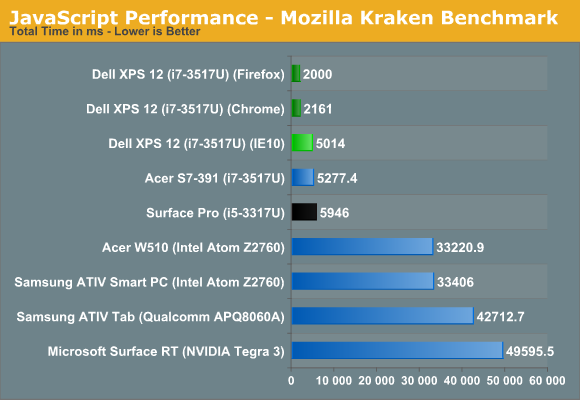
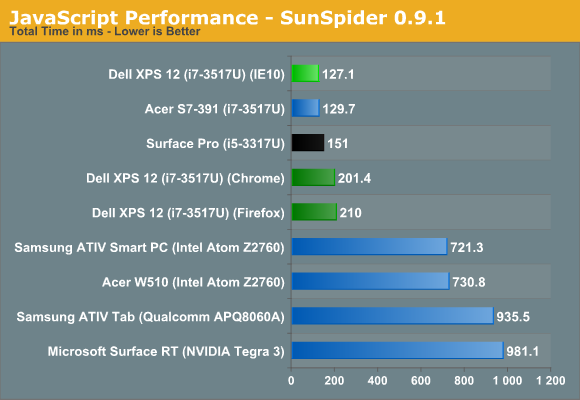
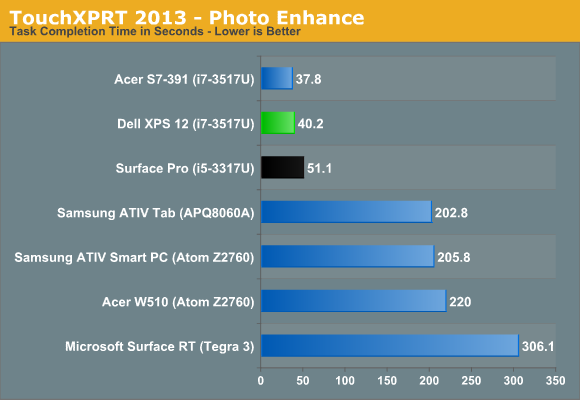
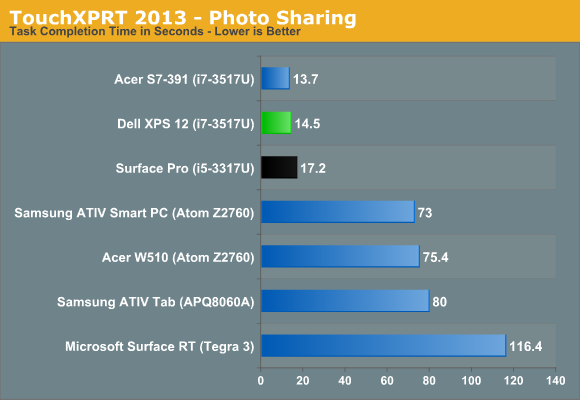
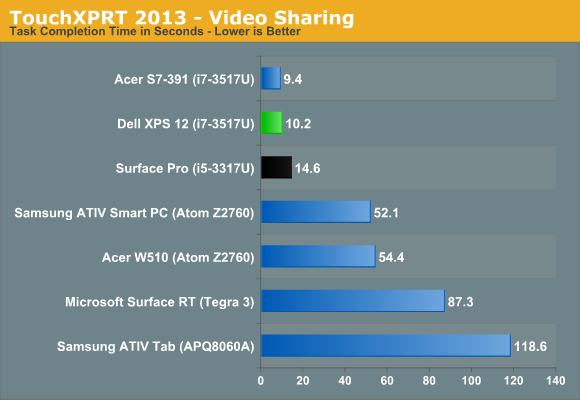
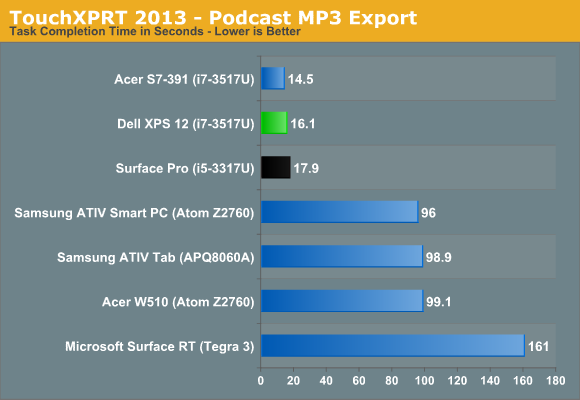
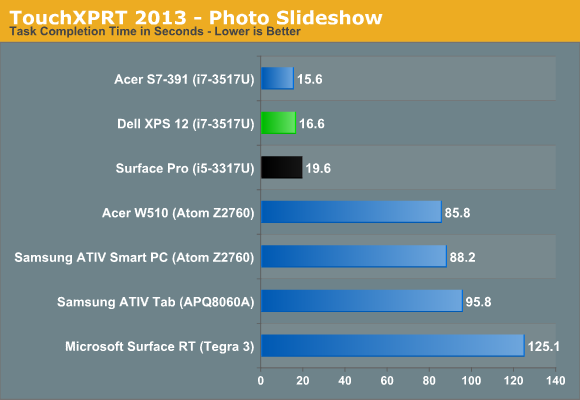
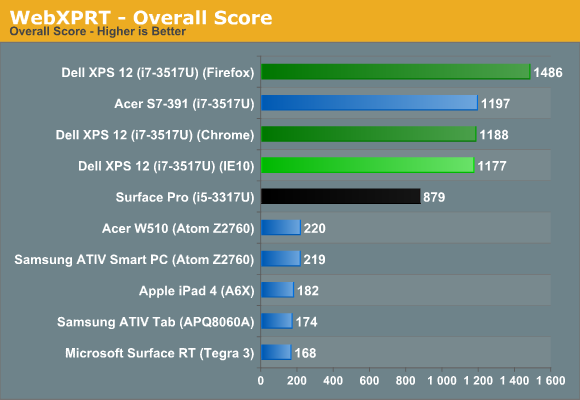
As we’ve noted in the past, while ARM and Atom can run a light OS like Android fine, and even Windows RT works well, that doesn’t mean we have anywhere near the same level of compute available compared to a full Core i5/i7 processor. And it’s not just about the performance shown in the above charts; start copying data to or from one of the Intel Core devices and you’ll notice a stark contrast compared to tablets with their slow eMMC storage and generally inferior WiFi and USB connections. Which is fine, considering the cost of the Surface Pro is the lowest of the Core offerings we’ve tested and still tips the scales at $900.
Intel has two paths going forward, and both are going to be quite interesting. On the one hand, Core gets updated with Haswell in the near future, which should lower power requirements and perhaps close the gap in battery life between Core and ARM/Atom. Whether they can actually close it or merely narrow it is the bigger question, but we’ll wait and see. On the other side of the equation, Atom will get a significant upgrade at the end of this year (or early 2014), and this will be the first time Intel has really put some effort into improving Atom performance. With a new architecture and a process shrink to 22nm, Intel’s codename Merrifield will be their most serious attempt at beating ARM and other SoCs and getting into more smartphones and tablets.










59 Comments
View All Comments
trekker99 - Friday, February 22, 2013 - link
I have no problems with the wifi, so it could be dodgy hardware. There was a wireless driver update in mid Jan also.Agree on the touchpad though, The driver update in late Jan helps somewhat.
retrospooty - Friday, February 22, 2013 - link
"’I'm no longer confident that our testing procedure works properly for Windows 8 laptops. "Its not you its Dell. I just set up an XPS 13 with the new 1080p option yesterday (for one of our users, not mine). Absolutely brilliant laptop in every way, except the LCD. Great res, but the color is just... wrong. I never really noticed it before, but I then looked at some other Dell's. We use mostly enterprise class Latitudes at work. I checked 6 others of various models and ages. They all sucked. Even the more expensive ones with high res screens were awful in Win 7 as well.
Termie - Friday, February 22, 2013 - link
Jarred - I agree with you that 8GB should now be standard, but you have a mistake on the first page: "$45 for 2x8GB at retail" - that should say 2x4GB. Also, memory prices are actually rising very quickly, so right now that's more like $50. Nonetheless, it's a great point, so I wanted to make sure your message doesn't get lost in that typo.JarredWalton - Friday, February 22, 2013 - link
Fixed, thanks!ssj3gohan - Friday, February 22, 2013 - link
I don't understand why laptop/tablet manufacturers even bother with 2x2 2.4/5GHz-only wireless-N if you can get 3x3 with dual frontends (i.e. simultaneous 2.4 and 5GHz communication, not just different bands on one or the other) for just a couple dollars extra BOM?I wasn't surprised to find a subpar wireless module (as a matter of fact, exactly the same as in the xps 12) in my budget laptop. There every dollar matters. Not in the XPS...
guidryp - Friday, February 22, 2013 - link
What's to understand?Same reason they use a third rate trackpad, same reason for small size of RAM, with expensive upgrade costs:
They are in this to make money.
$50 saved on production, using cheaper components in several areas, is $ 50 000 000 of additional profit on a million units.
Last I checked registered charities weren't building consumer electronics.
Every make of Consumer electronics does this (as do most other consumer goods).
CeriseCogburn - Monday, March 4, 2013 - link
That's a great excuse for making another unsatisfactory piece of crap. They really do have everyone brainwashed like robotic retards.The era of the brand new high end junk, it's top of the.... and every flappy lipped turd pub economist knows why they did it...
Crap is crap and they charge $50 more anyway.
jhoff80 - Friday, February 22, 2013 - link
Honestly? It could be much worse. At least this has a generally stable Intel Wireless card.The Surface Pro, supposedly Microsoft's flagship device, uses Marvell wireless and Bluetooth, and there's nothing but issues there.
The same goes for the Surface RT's Marvell Wifi, which maybe, possibly, supposedly, is going to finally get a Wifi fix in the firmware in March.
Egg - Friday, February 22, 2013 - link
"while ARM and Atom can run a light OS like Atom fine"While I'd love to have a truly light OS on a microkernel, I think Android was meant here.
JarredWalton - Friday, February 22, 2013 - link
Yup, fixed. Thanks!